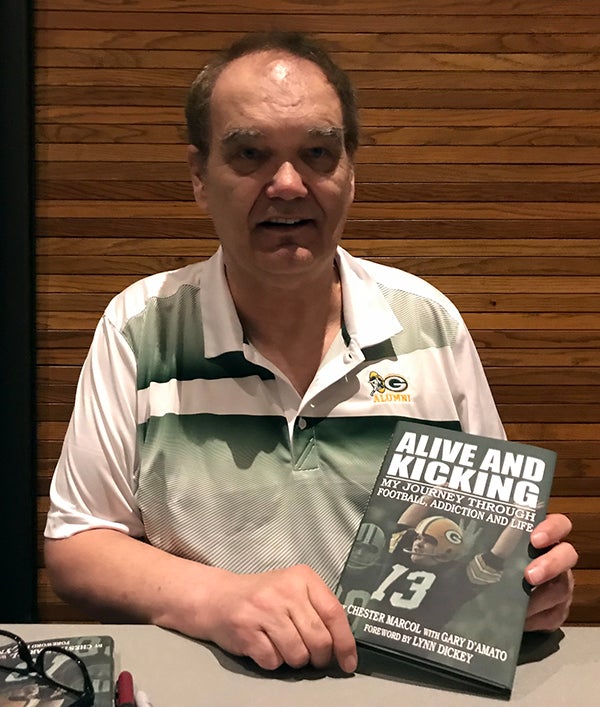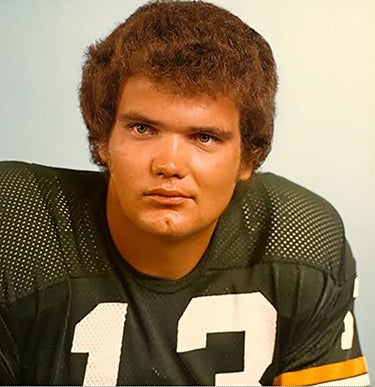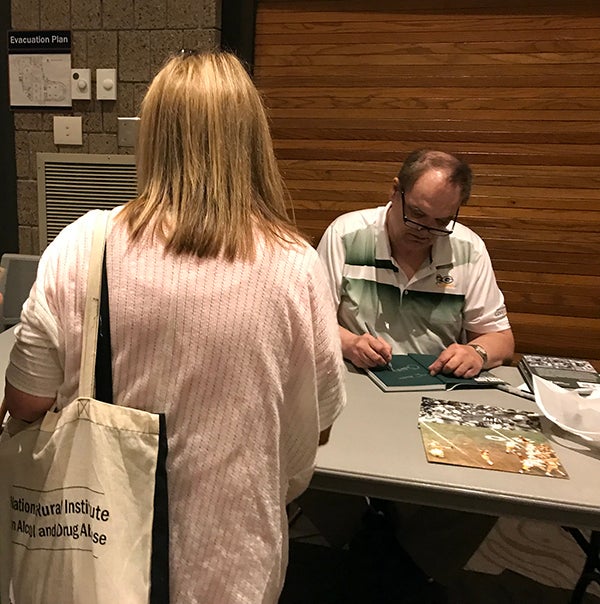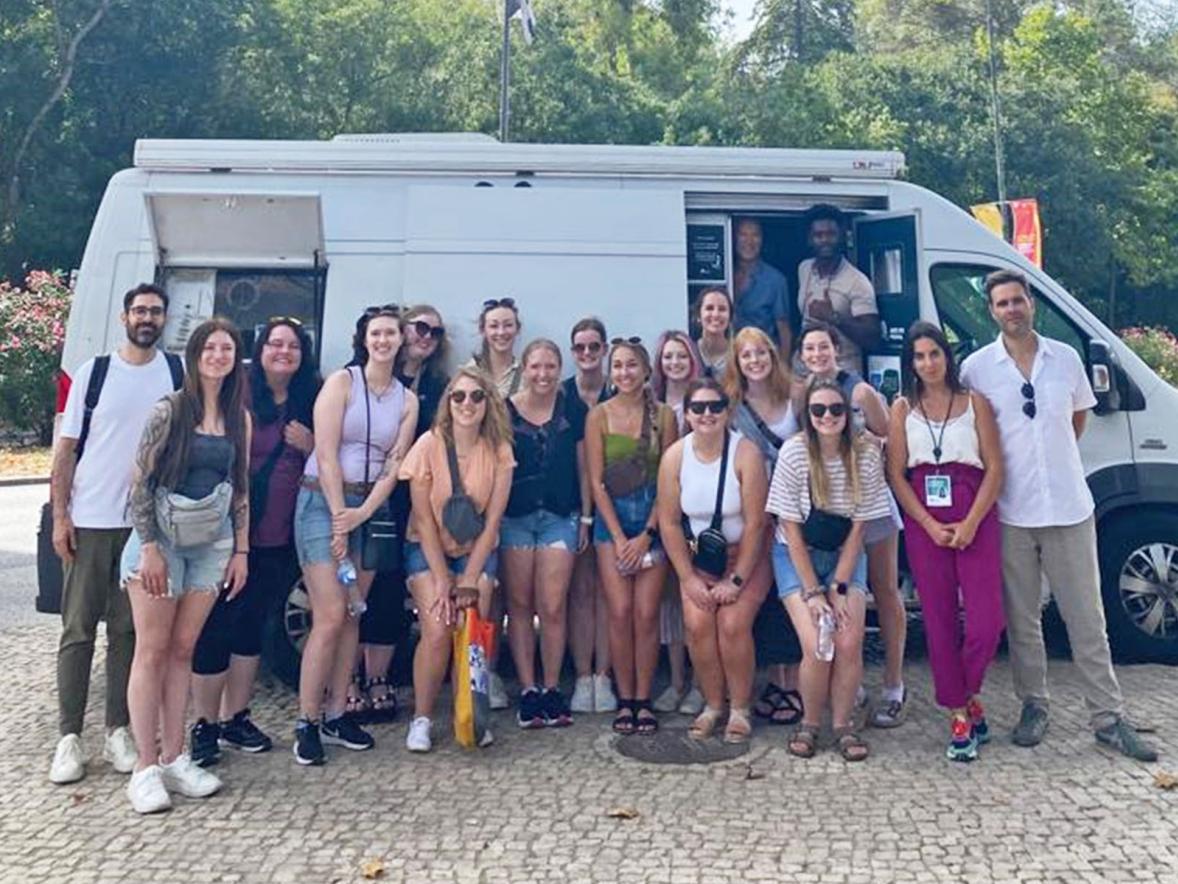Former Green Bay Packers kicker Chester Marcol gave a pep talk June 27 at University of Wisconsin-Stout to his new team — his colleagues who work as alcohol and drug abuse counselors.
Marcol was the closing keynote speaker at the National Rural Institute on Alcohol and Drug Abuse held over five days at the university’s Memorial Student Center. The 35th annual institute had 176 attendees from 27 states.
“People like you are the No. 1 reason why I’m alive,” said Marcol, whose talk “Hope in Recovery” focused on the need to never give up on people even when counseling doesn’t seem to be working.
 “We need to remind people to go to counseling. Don’t be like some of my (counselor) friends, who say, ‘Here comes Charlie again. He’s been here seven times.’ Help them as long as they’re breathing,” he said.
“We need to remind people to go to counseling. Don’t be like some of my (counselor) friends, who say, ‘Here comes Charlie again. He’s been here seven times.’ Help them as long as they’re breathing,” he said.
Marcol, 69, knows firsthand. He struggled for years to turn his life around, going through rehab 21 times over more than a decade, spending more than five years of his life in treatment.
His descent began in the mid-1970s with the Packers when he started drinking and taking opioids to ease the pain from an injury. He starting using cocaine in the summer of 1980.
Not coincidentally, five weeks into the 1980 season he lost his job as Packers kicker when his addictions began to affect him physically. The once-powerful leg that helped him kick a record 62-yard field goal in college and helped him become 1972 National Football League rookie of the year was no longer.
“Everything started going. I was never the same,” he said.
He hit bottom in 1986 when he tried to commit suicide by drinking battery acid. He was hospitalized for nearly two months, had multiple surgeries, at one point was warned he might end up in a nursing home for the rest of his life and still lives with some of the effects of the suicide attempt.
He also recovered from years of painful experiences as an alcoholic and drug user before he finally broke through — with counseling — and straightened out his life years after his suicide attempt. “I didn’t want to go back to the point in my life where I looked in the mirror and wanted to spit at what I saw.”
 He has worked as a counselor for about 30 years, including at the Phoenix and Libertas centers in Green Bay. “By the grace of God I’m here. I feel like I’m doing now what my maker wanted me to do, but I wouldn’t want to go through that again,” said Marcol, who lives near Green Bay.
He has worked as a counselor for about 30 years, including at the Phoenix and Libertas centers in Green Bay. “By the grace of God I’m here. I feel like I’m doing now what my maker wanted me to do, but I wouldn’t want to go through that again,” said Marcol, who lives near Green Bay.
His presentation began with an NFL Films segment that chronicled his rise to stardom as a Packers rookie, followed by his struggles. The footage featured one his most memorable plays, returning a blocked kick for a touchdown to beat the Chicago Bears in the opening game of the 1980 season.
He had snorted cocaine before the game. “I was high,” he said.
When his life spun out of control from his addictions, Marcol struggled with seeking help. “I couldn’t accept the fact I had mental health problems,” he said, admitting that he used to go to Alcoholics Anonymous meetings but kept beer in the trunk of his car for afterward.
“People never gave up on me. They provided me with hope,” he said. “I had counselors who helped me when I hated me.”
Looking back, he realizes that some of his problems began after his father’s suicide, prompting his mother and siblings to move from Poland to the U.S. In a span of seven years, he went from a teenage soccer player who didn’t know English to the man Packers fans called the “Polish Messiah.”
“My football career came fast. It was hard to digest all that ‘Polish Messiah’ stuff. I was 21 years old,” he said.
 Marcol has been attending the Natural Rural Institute at UW-Stout for 11 years. He traces the final step in his full recovery to his last rehab treatment in 2007, after which he began attending the institute. “My all-time favorite is coming here,” he said.
Marcol has been attending the Natural Rural Institute at UW-Stout for 11 years. He traces the final step in his full recovery to his last rehab treatment in 2007, after which he began attending the institute. “My all-time favorite is coming here,” he said.
The Packers over the years have helped fund scholarships for counselors to attend the National Rural Institute.
Another keynote speaker at the conference discussed the issue of opioids.
Teri McDougle, a retired AODA counselor from La Crosse, personally thanked Marcol afterward for his message. “What stood out for me was his spirituality, his gratitude, his resilience. He has a passion to help other people,” McDougle said.
She also enjoyed taking part in the institute’s annual softball game earlier in the week in Menomonie, in which Marcol played. As a longtime Green Bay Packers fan, when she saw Marcol on the field she thought, “Those legs are famous.”
After the talk Marcol signed copies of his book, “Alive and Kicking: My Journey Through Football, Addiction and Life,” which was published in 2011.
UW-Stout offers master’s programs in clinical mental health counseling and rehabilitation counseling.
###
Photos
Chester Marcol signs copies of his book, “Alive and Kicking,” after speaking at UW-Stout at the 35th annual National Rural Institute on Alcohol and Drug Abuse.
Chester Marcol kicked for the Green Bay Packers from 1972 to 1980.







